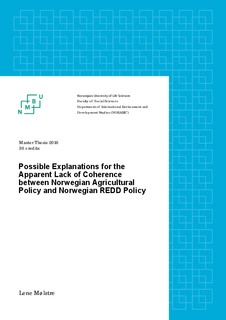| dc.contributor.advisor | McNeish, John Andrew | |
| dc.contributor.author | Mølstre, Lene | |
| dc.date.accessioned | 2016-08-23T10:34:12Z | |
| dc.date.available | 2016-08-23T10:34:12Z | |
| dc.date.issued | 2016-08-23 | |
| dc.identifier.uri | http://hdl.handle.net/11250/2401021 | |
| dc.description.abstract | My argument in this thesis is that there is an obvious lack of coherence between Norwegian agricultural policy and Norwegian REDD+ policy. This is because at the same time Norway support efforts in order to prevent further deforestation, Norway is also importing vast amount of soy for agricultural purposes. Due to Norway’s prohibition on genetically modified soy, Brazil is the only option, where Norway can get the amount needed. Soy was previously known as a main driver of deforestation in Brazil, where vast amount of forest was cut down in order to expand the industry. Due to several factors, among them, the soy moratorium, the deforestation has slowed down. However, I still see it as problematic that Norway import soy, due to the social consequence the industry has.
Based on this, I ask what explains this lack of coherence and how are they hindering the Government in achieving policy coherence for development
The concept of Policy coherence for development means that policies outside the development sector should be supportive of or at least not undermine development policies. In this thesis policy coherence for development is a goal, where the causes of incoherence is an obstacle in achieving this goal.
I have found several possible causes of incoherence using primary and secondary sources. I’ve had 14 interviews with people from different sectors. Furthermore, I have tried to gain a deeper understanding of the why the different causes make it difficult to achieve policy coherence for development. This I have done by using different theoretical perspectives within organization theory and international relations theory.
The main finding in this thesis is that different interests is the leading cause of policy incoherence. IR-theory and realism, state that national interests will always come first. By using the instrumental perspective I learned that organizations are locally rational, meaning they will do everything necessary to achieve their goals and in negotiations, the strongest coalition will win. In a myth perspective, it will be difficult achieve policy coherence for development because the Government constantly has to adopt certain myths in order to gain legitimacy, which may result in policy incoherence. | nb_NO |
| dc.language.iso | eng | nb_NO |
| dc.publisher | Norwegian University of Life Sciences, Ås | |
| dc.rights | Navngivelse 3.0 Norge | * |
| dc.rights.uri | http://creativecommons.org/licenses/by/3.0/no/ | * |
| dc.subject | Policy Coherence for Development | nb_NO |
| dc.subject | Norwegian International Climate and Forest Initiative | nb_NO |
| dc.subject | NICFI | nb_NO |
| dc.subject | soy | nb_NO |
| dc.subject | Brazil | nb_NO |
| dc.subject | Policy | nb_NO |
| dc.subject | Instrumental Perspective | nb_NO |
| dc.subject | Myth perspective | nb_NO |
| dc.subject | organization theory | nb_NO |
| dc.subject | international relations theory | nb_NO |
| dc.title | Possible explanations for the apparent lack of coherence between Norwegian agricultural policy and Norwegian REDD policy | nb_NO |
| dc.type | Master thesis | nb_NO |
| dc.subject.nsi | VDP::Social science: 200::Political science and organizational theory: 240::International politics: 243 | nb_NO |
| dc.subject.nsi | VDP::Agriculture and fishery disciplines: 900::Agriculture disciplines: 910::Other agricultural disciplines: 919 | nb_NO |
| dc.source.pagenumber | 96 | nb_NO |
| dc.description.localcode | M-DS | nb_NO |

